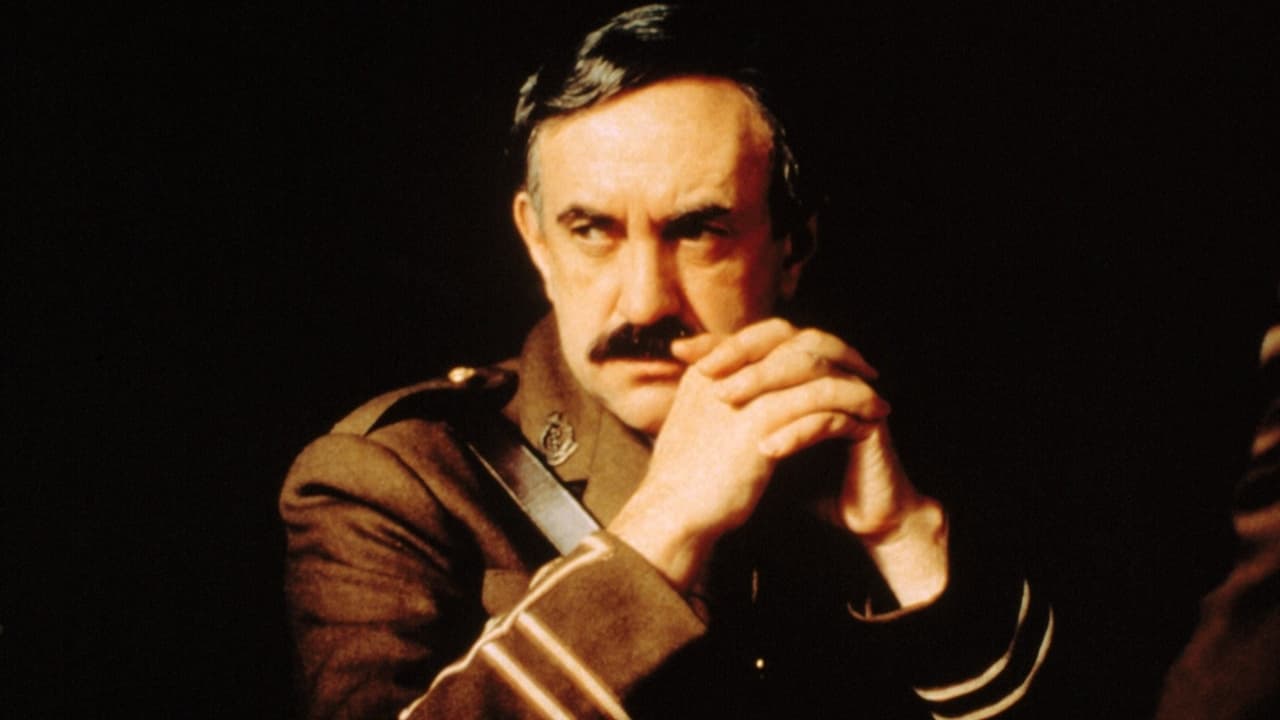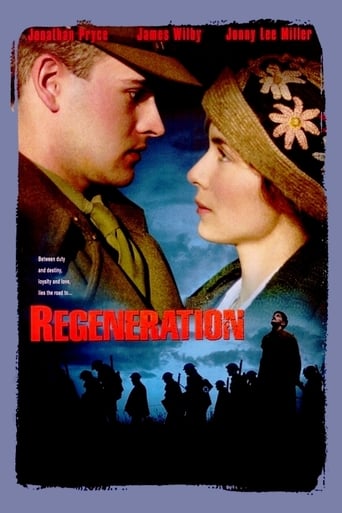



not as good as all the hype
Tells a fascinating and unsettling true story, and does so well, without pretending to have all the answers.
View MoreThis is a must-see and one of the best documentaries - and films - of this year.
View MoreLet me be very fair here, this is not the best movie in my opinion. But, this movie is fun, it has purpose and is very enjoyable to watch.
View MoreIn 1998 I saw a great war film that was lost in the glare of the nearly simultaneous American film releases of Terrence Malick's remake of The Thin Red Line- which is a great film, and Steven Spielberg's cliché and stereotype-dripping Saving Private Ryan. It was a 1997 Canadian and British film called Regeneration, directed by Gillies MacKinnon (who directed The Playboys, and Small Faces), based upon the famed book of the same title by British novelist Pat Barker. The screenplay was written by Allan Scott. There were a couple of differences between it and the other films; the first being that it was set during World War One, in 1917, while the other two took place during World War Two. The second was that Regeneration may have been the best film of the trio. In the years since, I have searched for the film on DVD, but it only was available in a Region 2 DVD format. Then, I recently found it online, released by Artisan DVD, for American audiences. The DVD is as bare bones as one can get- not a single bonus feature. But, even worse is the fact that it was released under a different, and far less compelling and more trite, title of Behind The Lines. Worse yet is the fact that this film is a bowdlerized, dumbed down version of the great film I remember seeing.While I cannot pinpoint all the changes from the original film, the overall effect on me was not as great. Oh, it's still a good film, but the greatness has been lost due to the cutting out of some scenes entirely and the trimming of others- to get the nearly two hour original film down to 95 minutes, and re-editing the film into shorter scenes that are interspersed with each other, designed to appeal to a more MTV and video game mindset. Lost in the rush to appeal to typical American idiocy was most of a small romantic subplot, and extended scenes between two of the main characters, the War Poets Siegfried Sassoon (James Wilby) and Wilfred Owen (Stuart Bunce). One has to guess that if the film had too much poetry in it that the McDonald's fed masses would be turned off. Yet, the worst cut, for me, comes about two thirds into the film, where Dr. Rivers (Jonathan Pryce), head of the asylum- Craiglockhart War Hospital in Edinburgh, Scotland, where shell-shocked soldiers go for psychotherapy, goes to London, on R&R, to visit a colleague, Dr. Yealland (John Neville), who is using a very effective form of electroshock therapy to get soldiers suffering from mutism to speak again. All these years later it was that scene, above all others, which stood out in my memory. As a mute soldier is strapped down and about to be shocked for the first time, the camera cuts away from the soldier, and as his agonal screams ripple outward, one only sees the slightly winced reaction of the doctor. It's a brilliant cut and displays the director's command of his craft, for it's a) always better to imagine such horrors, and b) the doctor is the more important character. However, in the Americanized DVD version, all that is lost. We see a standard, even generic, editing job of pain, the doctor wincing, pain, the doctor hanging his head, etc. Thanks, my native land!The film still has, however bowdlerized, more contemporary relevance than the other two films which drowned it out in 1998, if only because- given the current U.S. treatment of both its Prisoners Of War and veterans of the Iraq War, it shows how little supposedly 'civilized nations' have come in almost a century of warfare. It also touches on smaller aspects of the war, like mail censorship, which are never shown in war films, much less even discussed in many for a regarding warfare. While The film lacks the high tech graphics of its bigger budgeted cousins from 1998, the words of some of the poems, and the reactions of the soldiers say far more than mere 'shocking' images can, for words that are well chose can never inure their readers. Images, even great ones, can do just that through sheer repetition. That said, the best images in the film are not elaborate war scenes, but those designed to show the aftereffects of war on the human body and mind. As example, there is a young soldier who is a quivering wreck, wont to running naked through the woods and mutilating himself, because, we learn, he was thrown by a shell explosion, into the air and when he regained consciousness he was lying face down in the rotted corpse of a German soldier. Hearing what caused him to become so disturbed is more effective than showing his face inside a bloodied, rotting mass of flesh, for, as in the cut scene of Dr. Rivers turning away from the sight of electroshock therapy, what is imagined is always worse than what can be portrayed, for each individual will fill in the horror with their own fears, rather than having a fixed image in their minds.The cinematography, by Glen MacPherson, is stunningly realistic yet beautiful- especially in the sepia-tinged, color leeched war sequences, but throughout the whole film, as well; and it works well with the simple and understated musical score. It is a stark reminder that, then and now, one need not have all the high tech big budget special effects wizardry of a Steven Spielberg film to leave far more haunting images- perhaps the most effective one left in this bowdlerized film is the opening of a pair of human eyes buried in mud, so that the whites burn with startling intensity up at the viewer. If only the American distributors had not so badly butchered this film, from the title on, the rest of the film would have retained the intensity of those eyes which held me through nearly a decade.
View MoreThe film opens with a stunning tracking shot that reminded me of Tarkovsky; the technique is used again throughout the film to register the horror of war--the mud, the dead, and the shattered, flailing bodies. Most of the film, however, takes place in an insane asylum, far from the battlefield. Yes, the film is quite "talky," but the talk is very good, very intelligent, very thought-provoking. The film focuses on a number of relationships that develop--principally, the respectful but antagonistic "father-son" relationship between the famous war hero and poet Siegfried Sassoon (who has been sent to the insane asylum for penning an anti-war statement) and Dr. Rivers (whose mission is to get Sassoon to recant and back on the front lines). But other relationships are almost equally important--those between Dr. Rivers and an angry soldier named Billy Prior, between Prior and a local "munitionette," and between Sassoon and the man who would emerge, under his tutorship, as perhaps an even greater war poet, Wilfred Owen.The drama is based on real events, and the performances are quite stunning. Above all, Jonathan Pryce as Dr. Rivers is simply incredible, a man torn between duty and compassion, a doctor on the verge of becoming a patient himself. In a just world, he would have won an Oscar (but hardly anyone, it seems, saw this film on initial release). The handsome James Wilby gives a very fine performance as Sassoon--in fact, I've never seen him in better form. Johnny Lee Miller perfectly embodies the edgy anger, angst, and shame of Billy Prior. And Stuart Bunce brings a remarkably gentle, otherworldly quality to his haunting portrayal of Wilfred Owen. You absolutely believe that this man has a poet's soul; but he finds his voice not by contemplating beauty but by contemplating supreme horror.There are many scenes from this film I will never forget--particularly, Dr. Rivers' trip to see another doctor cure a patient of being mute by applying electricity directly to his teeth and larynx. This scene is horrifying and, yet, like the rest of the film, restrained, in part because of the way Pryce portrays Rivers' reactions. Another unforgettable scene is the abrupt, shattering ending--but I won't give that away. Suffice it to say that words, especially the words of a great poet, sometimes are more powerful than shocking images.This is a very intelligent, moving, humane, and important film. What a shame that it has been so overlooked.
View MoreRegeneration is one of those films you know in advance is going to be painful to watch. Some of the images are quite strong, almost electric, and the photography is very good. Good performances combined with seriously good writing make this an important film to see.
View MoreThis was an excellent movie. Amazing photography and casting and anintelligent scenario which passes messages about how horrific war isto the audience in the mildest yet touching way I've seen. The story involves a hospital in Scotland where officers are sent whenthey suffer a breakdown, a common phenomenon in the first and secondworld wars. In there, a doctor (played by Jonathan Pryce) attempts totreat his patients in a more humane way than the one other doctors ofthe time choose. Through the stories of characters in the hospital --including Siegfried Sassoon and Wilfred Owen, two poets who happen tomeet and become friends in the hospital -- the life of the Britishsoldiers in the first World War, as well as several political messagesabout that affecting era for humanity are successfully transmitted tothe audience, without blood, without effects or huge battle scenes ina way that touches and indicates its significance more than any otherfilm I've seen about the subject. The performances are excellent, with Johny Lee Miller -- who apartfrom this movie has not shown any signs of serious acting that I'veseen -- delivering a very good performance of a shocked and ambitiousofficer and Jonathan Pryce metaphorically accepting the ideas ofSassoon -- who opposes to the war after a point where he realises itsfutility and the lack of values in the politicians driving it -- canbe though as the link between the soldiers and humanity itself. It is definitely a movie I would recommend! Excellent.
View More